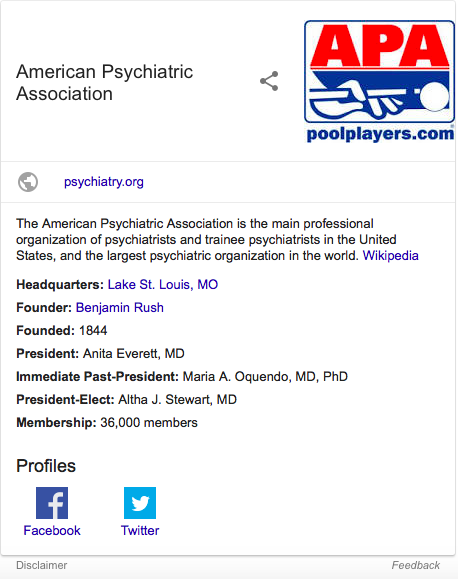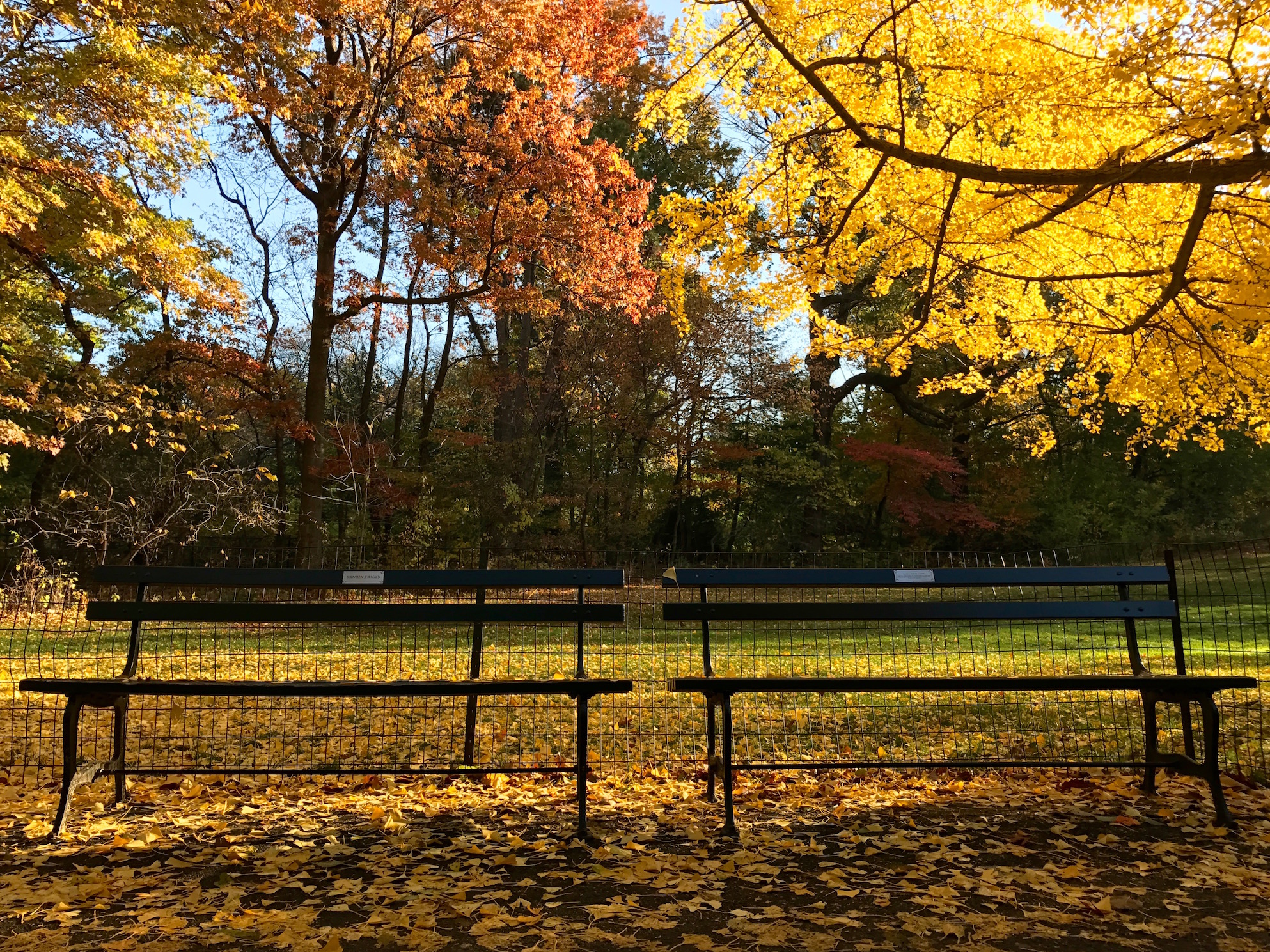
Escribir corto, para concluir antes de hastiar.
I can never remember if the APA is the American Psychiatric Association or the American Psychological Association. Searching in Google for american psychiatric association today, I saw this Knowledge Graph mistake:

Note that Google’s Knowledge Graph correctly states that the American Psychiatric Association’s website is psychiatry.org, but includes an image from a very different APA.




A couple of years ago, as the 2014 NFL season was about to begin, I wrote down some ideas for how I thought professional football could be improved. Here is a quick list of those ideas:
– Bonus: end the salary cap and free agency.
Since then, I’m pleased to say, there are a couple of positive signs that things are improving in the NFL. For example, Gizmodo says The NFL Will Start Playing With Chip-Equipped Footballs This Summer and Consumerist says the NFL (is) Literally Studying Whether It Should Move The Goalposts (LITERALLY).
It’s nice that professional football is evolving, but I still think there are a lot more good ideas that ought to be discussed. Below are some more. Enjoy!
Regulated uniformity is boring and diversity is exciting, so every team should be free to have a (slightly) different size field. This will make it much more difficult for visiting teams who are unaccustomed to strangely sized fields, but also much more difficult for a team that has a strangely sized field when they travel to play a game elsewhere.
I do think some parts of the field should be standard: it needs to be one hundred yards, marked in ten yard increments. But I see no reason why the field width can’t be left up to the decision of each team, and also the size of the end zones. Nor would it bother me if some teams’ fields weren’t perfectly flat, with inclines and depressions in different areas. Nor would it entirely bother me if the definition of the unit of measurement “yard” varied a bit between the east coast and the west coast.
This works really well in baseball, so I’m excited to see how well it plays out in the NFL.
Benefits: strategy, fan engagement.
When a team violates certain big rules, such as hitting a defenseless receiver, the other team should get their next score. If the offending team doesn’t manage to score again, then nothing would happen – or the next score penalty could be carried over to the following week’s game, or even from one season to the next. I expect that a next score penalty would cause teams to try to hurry up and get a field goal as quickly as possible, resulting in a lot of interesting risks and big plays – and big flops.
Benefits: strategy.
The result of an incomplete pass is a loss of the down, and this encourages teams to pass more, as they don’t give up very much even with a low completion rate. What if an incomplete pass resulted not in a loss of the down, but in a loss of yards? It could either be a set amount of yards, such as three, or the yardage lost could be equivalent to where the quarterback was standing when he threw the ball. Even better, the defense could get to choose after each incomplete pass whether to go to the next down at the previous line of scrimmage or repeat the previous down, with the lost yards.
Benefits: strategy.
How is it that there are two people on every NFL team who don’t really do what we would normally consider to be “playing football,” one of them only punting the ball and one of them only place-kicking it? It’s really dumb to have people whose tasks are so specialized, and particularly so tangentially related to football. So teams should not be allowed to have players who only kick the ball.
One way to accomplish this would be just to make the quarterback be the kicker. Or when kicking off after a score, the person who scored could kick.
Benefits: strategy.
As a fan of a team with one of the greatest rivalries in professional sports, I think it’s great that my beloved Redskins get to play the hated Cowboys twice every season – because they’re in the same division. It’s terrible, though, when players and coaches go from one division rival to another, like Alfred Morris or N*rval Turner. This reduces fan loyalty and makes me like the game less.
Players and coaches should be banned from leaving one team to join another team in the same division immediately. The standard contract should specify that they can not sign with a division rival for a time period equal to the length of the contract.
Benefits: fan engagement.
I can hardly think of something more non-football-like than a coin toss. This boring ritual should be replaced with an exciting ritual, such as an arm wrestling match between the two teams’ head coaches (or their owners)!
Benefits: fan engagement.
Salary caps are inherently unfair, in a calculated way: the aim is to get every team in the league spending roughly the same amount of money on players. Roster limits (i.e., no more than 53 men on a team) are also inherently unfair, for the same reasons. I accept the concept of these inherent unfairnesses, but I see no reason at all to have both a salary cap and roster limits.
Going with only a salary cap, a team could go out and recruit hundreds or even thousands of potential players, paying them each very little money (current average annual salary in the United States is slightly higher than $50,000). If that’s how they want to spend their money, let them do it!
Going with only roster limits – well, we know how this would work, because it’s how things work in other sports that don’t have a salary cap. This approach allows players to negotiate sky-high salaries, and it allows owners who are super rich to build great teams, while owners who don’t care or can’t afford it have to focus on drafting wisely.
Benefits: strategy.
One of the fascinating storylines every football season (and something that actually plays out on rare occasions) is what happens when the starting quarterback gets injured, and his backup gets injured, and the third-string guy (if there is one) also gets injured: who then takes the snaps? Typically there’s another guy on the team – often a wide receiver, I think – who’s supposed to do it. And of course, this could happen as well as part of a trick play.
It should happen more often. No single player should be allowed to take more than thirty snaps in a row.
Benefits: strategy.
I hate it when players blatantly signal to the referees to call penalties against other players. It’s unprofessional and obnoxious. It should be a personal foul for a player to accuse another player of breaking a rule.
Benefits: professionalism.
Previously I suggested we shouldn’t let announcers call players by their first names, and now I’ve come up with what I believe will be an adequate way to deal with this. Any time an announcer refers to a player by his first name, the NFL should fine the television or radio network, unless the network makes the announcer apologize on air.
Benefits: professionalism.
One of the critiques of football from non-fans is that the players spend so much time not-actually-playing. As someone who’s watched the game for a few decades and played at a much, much, much lower level, I understand why it takes so much time between plays, but I still think there should be ways to speed it up. Right now the play clock allows forty seconds from the end of a play to the next play (or twenty-five seconds after a timeout or something like that). I’d like to take away five seconds from the play clock per quarter. So in the first quarter there would still be forty seconds, but in the second, third and fourth quarters, the play clock would only have thirty-five, thirty and twenty-five seconds respectively. This could have a dramatic impact at the end of games, when players are exhausted and fans are on the edges of their seats.
Benefits: strategy, fan engagement.
Previously I suggested that the league should fine teams whose players “take a knee” because it’s unprofessional and ruins the game.
I’ve come up with an idea that I think would be better than monetary fines for millionaires and billionaires: teams that take a knee at the end of a half should have that time deducted from the play clock in their next offensive series, even if it’s in the following week’s game (or even if it has to carry over to the next season).
Here’s an even better idea: since typically only a winning team would take a knee, if they do it, their previous score should be forfeited.
Benefits: professionalism.
I can’t be the only person who thinks that touchbacks are pretty crappy. Recently the rules were adjusted so that the receiving team gets the ball on the 25 yard line rather than the 20 yard line, a slight disincentive to the kicking team to kick too far. So that’s an interesting idea, but unfortunately it increases the incentive to the kicking team to let the ball go into the end zone on a kickoff, disincentivizing them from actually returning the kick (presumably for safety reasons), which I don’t like.
Touchbacks as they are have to go, and I don’t know what should replace them, but here are some ideas for the touchback situation:
– The receiving team gets the ball at their own one yard line. This would cause a huge increase in safeties, and incentivize returns.
– The receiving team gets the ball at the kicking team’s one yard lines. This would cause a huge increase in touchdowns, and incentivize more strategic kicking (and a massive investment in kickers who are able to kick not just powerfully, but precisely).
– Make a touchback count as a score – maybe one point – for the receiving team.
Benefits: it depends, but safety and strategy.
Previously I advocated limiting the number of players involved in kickoffs and punts and I stand by that idea, though it’s also possible that I’m entirely wrong and that it would make those plays even more dangerous than they already are. So how about this idea: the receiving team should get a head start of three seconds after touching the ball, before the kicking team is allowed to make physical contact.
Benefits: safety.
A fifteen yard field goal earns the same number of points – half a touchdown – as a sixty-four yard field goal? Come on, nobody thinks this makes sense. Instead, longer field goals should earn more points. I propose one point for every ten yards.
Benefits: strategy.
Some years back, I thought it was great that the NFL took the two point conversion from college football. But why on earth are there only two different options for a team that’s just scored a touchdown? Here are two more possible choices:
– Three point conversion: defensive squad plays next series with only ten men on the field
– Zero point conversion: no kickoff, and other team’s offense has to start on their own one yard line.
Benefits: strategy.
There should be a lot more teams in the NFL, probably twice as many. If there were many more teams.
Benefits: fan engagement.


